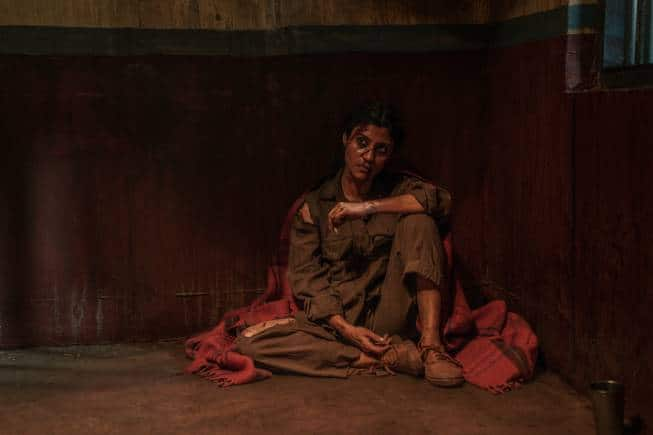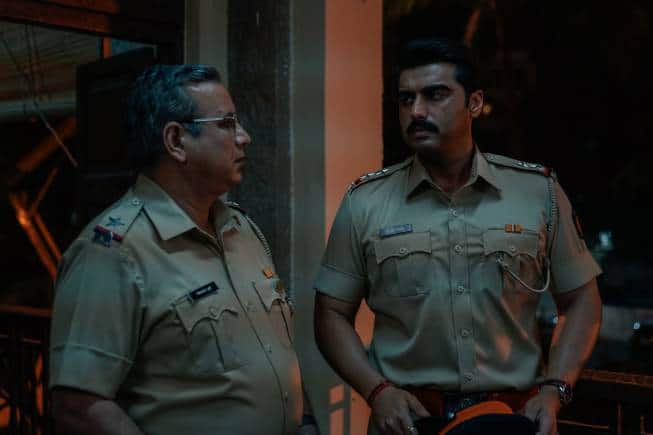A still from Aasmaan Bharadwaj's 'Kuttey' (2023).
Aasmaan Bhardwaj’s Kuttey begins with a profusion of bloodbath and crimson. A wounded Naxal leader (Konkona Sen Sharma), black and blue, narrates a long-winded fable about a goat, a dog and a lion to the police officer (Kumud Mishra) who has her in custody. According to her nihilistic worldview, the lion is the system or the government, she and her ilk are the goat and society and police are the dog or the kuttey. What ensues is a lot of kuttey-baazi, as Bhardwaj, also the film’s writer, sees it — greedy, corrupt canines chasing a van full of cash, shooting everything that comes in their way. A tertiary drug cartel drama is thrown in, and a heist rounds it off.
Bullets fly a lot — textbook Tarantino-esque, where just when you think you’ve had enough, a head just plops down from a person’s neck spouting a blood fountain. Or someone goes looking for a gun under a swimming pool, its water gone red after a brazen shoot-out for no satisfying reason.
Tarantino worship is obvious; the film is structured like several of Quentin Tarantino’s films, divided into chapters and bookended by a prologue and a epilogue. There are touches of the director’s father, Vishal Bhardwaj, who himself has a lens similar to Tarantino in the way he treats and visualises scoundrels and misfits. Riffs of Dhan te nan, a track from Vishal Bhardwaj’s Kaminey (2009) play in the background as the violence unfolds — the director’s relish translating on the screen with mad energy. And like his father’s films, the milieu is largely north Indian, but in a Mumbai setting. Setting and age is of little consequence in the film. One moment it feels like Mumbai noir, and the next, a Nowhereland. It’s a lot of barking and yowling, bullets flying, cops, crooks and lovers plopping down in gunfights and then rising in slow-motion. Naxals pop up in unexpected corners like a sparse forest near Lonavala.
 Konkona Sen Sharma in 'Kuttey'.
Konkona Sen Sharma in 'Kuttey'.
Bhardwaj begins the film with immense promise, placing the conflict between Naxalism and the law-and-order system outright. But he is so marginally invested in authentic details of his characters’ contexts, depending on arduously narrated fables and stories to convey the story’s theme and gist, that the film often feels like an overstretched pitch or a trailer of a film. There are many ideas here, but none of them coalesce for the powerful narrative it was meant to be.
The crew is impressive. Vishal Bhardwaj’s phonetic-driven, racy and raspy music to Gulzar’s lyrics accentuate the mayhem further. Editing by L Sreekar Prasad maintains a perfect balance between frenetic sequences and noir-like drawls in the action. Farhad Ahmed Dehlvi’s cinematography is focussed on conjuring gory beauty rather than capturing a city, a mood or emotions.
Tabu plays a police officer who is the most memorable character in the film. Like all the rest, she gives away little more than cynicism, but the wicked, off-kilter humour of the dialogues by Vishal Bhardwaj, replete with choicest of Hindi slangs, save her character from becoming boring. We know nothing about her except her life as a police officer sucks, and that she wants a crore of rupees to buy a new house that fits her size and allows her to stretch peacefully when she wants to. She gets two long-winded fables in the form of a joke, both familiar. One is about logic versus character, a version of which we have already seen in Darlings last year, and the other is the age-old story of the frog and the scorpion. Tabu performs her role with enough sass, just like her character, gleeful in her authority and reign over men as petty as her but lower than her in the police hierarchy.
Sen Sharma makes a big impact in the first scene of the film and appears much later as a caricature in the climactic scenes — a contrived way to tie in the narrative. Naseeruddin Shah has a cameo that requires him to look menacing and talk less. Kumud Mishra is brilliant as a police officer looking for salvation through money. The film’s protagonist is his younger boss played by Arjun Kapoor — a frightened crook on his knees in one scene and a blood-baying gunman on a rampage in another. Kapoor carries off the role with confidence and ease — one of his best performances.
 Kumud Mishra and Arjun Kapoor in 'Kuttey'.
Kumud Mishra and Arjun Kapoor in 'Kuttey'.
Ultimately, performance, character, historicity and structure are secondary in Kuttey. What the debutant director is interested in is to impress how stylish violence can be. Many directors have started here: worshipping and moulding themselves in this genre-bending Tarantino style of filmmaking. This feels like a student effort swollen up to feature-film length. The film’s relentless raucousness exhausted me enough to be not interested in the climactic twist.
The frog and the scorpion hop on to greener pastures when the film ends, and the twist which comes at the end, suggesting divine justice through black humour of a national scale, is sure to extract some chuckles.
The ending is neat.
P.S.: Dog lovers, please don’t take offence. These kutteys are nothing like your babies, blame it on the inspired slang.